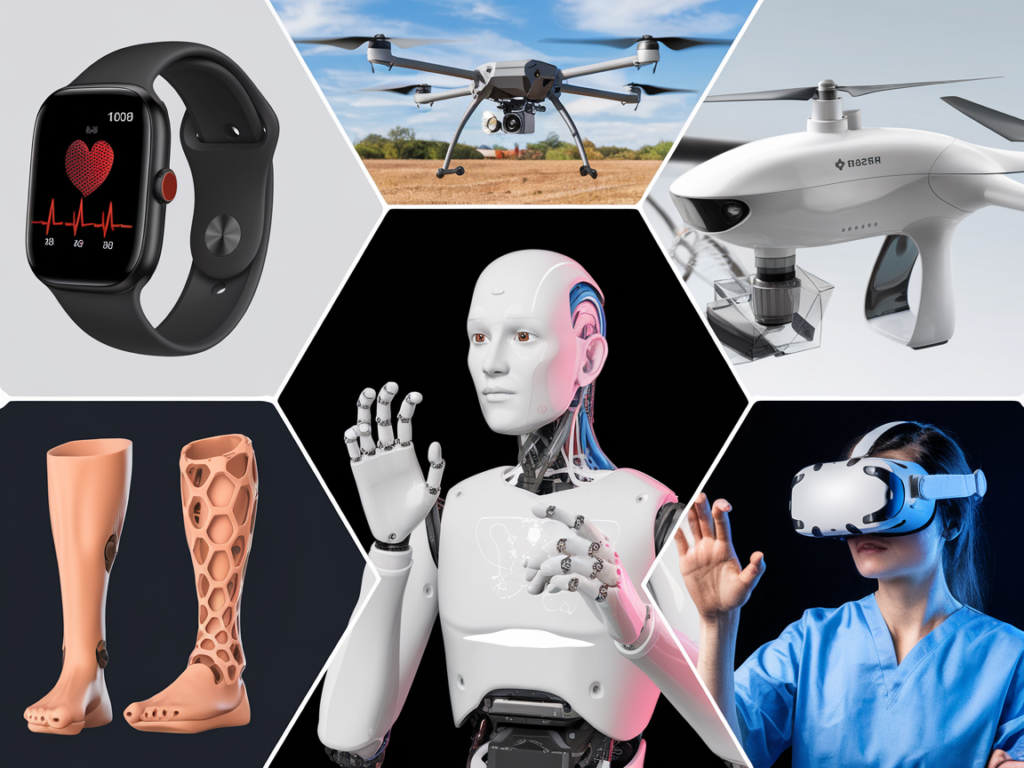
"Discover the future of healthcare with 5 innovations that will shape 2024!"
Meta Description: Discover 5 groundbreaking healthcare innovations in 2024 that are transforming the industry. From AI diagnostics to telemedicine, explore the trends shaping the future of healthcare.
The healthcare industry is undergoing rapid transformation, driven by groundbreaking innovations that promise to revolutionize patient care and improve health outcomes. As we enter 2024, advancements in technology, personalized medicine, and remote care are leading the way to a more accessible, efficient, and effective healthcare system. But what are the specific trends to watch in the year ahead?
In this article, we will explore five major innovations that are shaping the future of health and wellness. Whether it’s the rise of telemedicine, the integration of AI in diagnostics, or the growing emphasis on preventive care, these trends are not just transforming healthcare—they are redefining it.
1. Telehealth and Remote Care: Expanding Access to Healthcare

One of the most significant shifts in healthcare over the past few years has been the rise of telehealth, which allows patients to connect with healthcare providers remotely. What started as a necessity during the COVID-19 pandemic has now become a permanent fixture in many healthcare systems, improving access to care for people in underserved or rural areas.
In 2024, we can expect telemedicine to continue expanding, with more healthcare professionals adopting virtual consultations, remote monitoring tools, and digital health platforms. Telehealth’s convenience and accessibility are major advantages for patients who need regular check-ups but may not be able to visit a clinic in person.
Why It Matters:
- Convenience: Virtual consultations save time and reduce travel costs.
- Accessibility: Patients in remote locations can now access specialists without long waiting times.
- Cost-effective: Telehealth appointments are often less expensive than in-person visits, making healthcare more affordable.
2. Personalized Medicine: Tailoring Treatments to Your DNA

Personalized medicine is set to become a cornerstone of healthcare in 2024. By using genetic information, healthcare providers can design treatments specifically tailored to an individual’s genetic makeup. This approach improves treatment efficacy and reduces the risk of adverse reactions, making it a game-changer, especially for complex diseases like cancer.
Advancements in genomic research are also enabling early detection of potential health risks, allowing for preventive interventions before conditions become serious. Personalized medicine is not just about treating diseases but about predicting and preventing them.
Why It Matters:
- Better outcomes: Treatments are customized to suit your genetic profile.
- Fewer side effects: With targeted therapies, patients experience fewer adverse reactions.
- Early detection: Genetic testing can catch health risks before they manifest into chronic conditions.
3. Artificial Intelligence (AI) in Diagnostics and Decision-Making

Artificial intelligence (AI) is playing an increasingly prominent role in healthcare, with applications ranging from diagnosing diseases to aiding in decision-making. In 2024, AI will continue to enhance diagnostic accuracy, particularly in areas like medical imaging. AI algorithms can analyze X-rays, MRIs, and CT scans faster and more accurately than human doctors in some cases, providing early diagnoses for conditions like cancer, heart disease, and neurological disorders.
Moreover, AI’s ability to predict patient outcomes and suggest the most effective treatment plans is empowering healthcare providers to make smarter, data-driven decisions.
Why It Matters:
- Faster diagnoses: AI can analyze medical images and data in a fraction of the time it would take a human.
- Accuracy: AI models can detect conditions that may be overlooked by human providers.
- Predictive power: By analyzing large datasets, AI can predict health trends and personalize care for patients.
For more on AI in healthcare, check out this Healthcare IT News.
4. Preventive Care and Wellness: Shifting the Focus from Treatment to Prevention
In 2024, there is an increasing focus on preventive healthcare rather than simply treating illness after it occurs. Advances in data analytics, wearable devices, and genetic testing are allowing individuals to monitor their health in real-time and make proactive decisions about their wellness.
Wearable technology, like fitness trackers and smartwatches, now tracks everything from heart rate to sleep patterns, providing insights into early warning signs for chronic conditions like diabetes, hypertension, and heart disease. This data can be used to make lifestyle changes before symptoms arise, potentially preventing the onset of serious diseases.
Why It Matters:
- Early intervention: Wearables and health apps can alert individuals to health issues before they become serious.
- Chronic disease prevention: Monitoring lifestyle factors like diet and exercise helps reduce the risk of developing long-term conditions.
- Health optimization: Individuals can proactively manage their health, leading to better overall wellness.
For more on preventive healthcare, visit the CDC’s Preventive Care page.
5. Mental Health Integration: Prioritizing Emotional Wellbeing
In 2024, the integration of mental health into mainstream healthcare continues to gain momentum. As the stigma around mental health continues to decrease, healthcare systems are placing a stronger emphasis on treating mental and emotional well-being alongside physical health. This includes a growing focus on therapies, counseling, and digital mental health tools that allow individuals to access support when and where they need it.
Teletherapy and mental health apps are making psychological care more accessible than ever before, giving individuals the flexibility to seek help without having to visit a therapist in person.
Why It Matters:
- Holistic care: Mental health is now seen as a vital component of overall health.
- Greater accessibility: Digital mental health services remove barriers to care for people in need.
- Stigma reduction: As mental health is integrated into regular healthcare, the stigma surrounding it continues to lessen.
Learn more about mental health services at the National Institute of Mental Health (NIMH).
Conclusion: A Healthier, More Accessible Future
As healthcare continues to evolve, the innovations discussed here are paving the way for a healthier, more accessible, and more effective system. Whether it’s through telehealth, personalized medicine, AI-powered diagnostics, or a stronger focus on preventive and mental health care, 2024 is shaping up to be a year of tremendous progress in improving health outcomes globally.
However, challenges remain in addressing disparities in healthcare access, affordability, and the integration of new technologies. By staying informed and engaged with the latest developments, we can all play a part in contributing to a future where everyone has access to high-quality care.
FAQs About Healthcare Innovations in 2024
Q1: What is personalized medicine? Personalized medicine tailors medical treatments based on individual genetic profiles, ensuring that patients receive the most effective therapies with minimal side effects.
Q2: How can AI improve healthcare? AI can help diagnose diseases more accurately and quickly, predict patient outcomes, and support decision-making in clinical settings, ultimately improving patient care.
Q3: Why is preventive care so important? Preventive care focuses on early detection and lifestyle changes that can reduce the risk of chronic conditions, helping people stay healthier for longer and avoid costly treatments.
Q4: What role do wearables play in healthcare? Wearables track key health metrics, like heart rate and sleep patterns, and help individuals monitor their health, alerting them to potential issues before they become severe.
Q5: How is mental health being integrated into healthcare? Mental health services, including therapy and counseling, are becoming more integrated into general healthcare practices. Digital tools like teletherapy and mental health apps are helping improve access to care.





